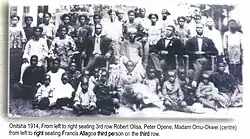Omu Okwei
Omu Okwei Opene | |
|---|---|
| Born | 1872 |
| Died | 1943 (aged 70–71) |
| Nationality | Nigeria |
| Other names | The Igbo Merchant Queen |
| Citizenship | Nigerian |
| Title | Omu Okwei of Ossomari |
| Spouse(s) | Joseph Allagoa, Opene of Abo |
| Children | (First Son) Francis Allagoa. Mingi X of Nembe. (Second Son) Prince Peter Opene. (Great Grandson) Hon. Justice Ambrose E. Allagoa, Mingi XI Amanyanabo of Nembe (1914-2003). [1] |
| Parent | Prince Osuna Afubeho Nzedegwu |

Madam Okwei Opene, otherwise known as Omu Okwei of Ossomari (1872–1943), was a Nigerian queen merchant from Ossomari.
Life and career
Madam Omu Okwei-Anuenyi Opene was born in 1872 to Igbo Prince Osuna Afubeho Nzedegwu, an Ossomari native and one of his wives, a granddaughter of Abo king Obi Ossai (1830-1844). Her grandfather was HRH Atanmaya Nzedegwu I (1830-1854) of Ossomari. He was the Lower Niger Valley Igbo king known for signing the treaty for the abolition of the slave trade and welcoming of western education in area.[2]
At the age of 9, her mother sent her to live among the Igala with one of her aunts. She learned basic business practices, and traded fruits, yams and poultry. When she was 15, following the death of her father, she lived with her mother at Atani, a city on the Niger River.[3]
In 1889, she married Joseph Allagoa, a trader from Brass.[4] Her family disapproved of her choice and did not give her a dowry. The couple had a child, Joseph, and divorced the following year. She traversed the Niger River, selling clothing, pots, and lamps. She exchanged the merchandise for food which she then sold to Europeans. In 1895 she married Opene of Abo, and later had a second son, Peter.[3]
The British colonial government formalized male institutions while undermining those of the women. Officials issued warrants to men that gave them the authority to sit in Native courts. Okwei was one of few women who were offered a warrant and served in the Onitsha Native Court from 1912 until the 1930s.[5]
She was given the title of omu of the Ossomari in August 1935. In the traditional dual-sex government, the omu was the apex leader of the congress of women leaders, overseeing women's affairs and settling disputes.[3] olisa She was elected Market Queen, Chairwoman of the Council of Mothers after amassing a fortune. She was the last merchant queen before the British replaced the Council of Mothers' traditional role supervising retailing.[3][6] Okwei died in 1943 in Onitsha, Nigeria.[3]
Her nephew, HRH Robert Olisa. Nzedegwu II of Ossomari (1894-1999) served as the Executor and Trustee of her estate and custodian of her tomb located at the Ugolo Village Ossomala.[7] Additionally, she is the great great grandmother of Nigerian British singer Ikstarr.[8]
References
- ^ Ekejuba, Felicia. Omu Okwei, The Marchant Queen of Ossomari A Biographical Sketch=1967. Ibadan Nigeria: Historical Society of Nigeria. p. Vol 3, No 4. p633-646.
- ^ Olisa, Chukwuemeka. Ossomari, a kingdom of the lower Niger Valley (1640-1986)a comparative study of the tradition of origin, migration, and settlement of a Niger Ibo kingdom=1990. Onitsha Nigeria: InterLab Press. p. 55. LCCN 91160193.
- ^ a b c d e Commire, Anne, ed. (1999). "Okwei of Osomari (1872–1943)". Women in World History: A Biographical Encyclopedia. Waterford, Connecticut: Yorkin Publications. ISBN 0-7876-4080-8.
- ^ Aka, Jubril Olabode (2012). "Madam Omu Okwei". Nigerian Women of Distinction, Honour and Exemplary Presidential Qualities. Trafford Publishing. p. 176. ISBN 978-1-4669-1554-1.
- ^ Chuku, Gloria (2013). The Igbo Intellectual Tradition: Creative Conflict in African and African Diasporic Thought. New York: Palgrave Macmillan. p. 16. ISBN 978-1-137-31129-0.
- ^ Uglow, Jenni S., ed. (1985). "Okwei, Omu". The International Dictionary of Women's Biography. New York: Continuum. p. 352. ISBN 0-8264-0192-9.
- ^ Olisa, Emeka (1971). The installation of Chief Ezeama Robert Olisa as the Atamanya Nzedegwu II of Ossomari with fragments of Ossomari history. Enugu Nigeria: Malfina press. p. 17. LCCN 77372422.
- ^ Dan Anazi (7 November 2020). "ikstarr-Without artistic integrity you have no legacy". The Guardian Newspaper. The Guardian Newspaper. Retrieved 22 November 2020.
Further reading
- Boahen, A. Topics in West African History. London: Longmans, 1966.
- Coleman, J.S. Nigeria: Background to Nationalism. Berkeley, CA: University of California Press, 1971.
- Ekejiuba, Felicia. "Omu Okwei of Osomari," in Nigerian Women in Historical Perspective. Edited by Bolanle Awe. Lagos, Nigeria: Sankore Publishers, 1992, pp. 89–104.
- ——. "Omu Okwei, the Merchant Queen of Osomari: A Biographical Sketch," in Journal of the Historical Society of Nigeria. Vol. III, no. 4, 1967.
- Hatch, John Charles. Nigeria. A History. London: Secker & Warburg, 1971.
- Okonjo, Kamene. "Nigerian Women's Participation in National Politics: Legitimacy and Stability in an Era of Transition," in Working Paper #221. East Lansing, MI: Women and International Development Program, Michigan State University, July 1991.